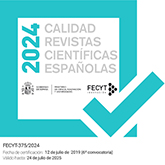Intonation and its interfaces in Sardinian polar questions
DOI:
https://doi.org/10.3989/loquens.2014.014Keywords:
Sardinian, polar questions, intonationAbstract
In this paper we investigate the interplay between lexicon, syntax, intonation and pragmatics in Sardinian polar questions. To this end, a production study was designed to elicit polar questions with different bias and polarity conditions by means of the Discourse Completion Task Methodology. The resulting data were then prosodically and syntactically annotated using Praat. The results can be summarized as follows. Regarding lexico-syntactic markers, the particle a functions as a mitigator or politeness marker, whereas constituent fronting and negation correspond to positive and negative polarity respectively. In addition, two main intonational patterns can be distinguished: the ¡H+L* L% pattern, which expresses “lack of bias”, and the ¡H*+L L- pattern, which conveys the speaker bias towards the proposition.
Downloads
References
Álvarez, A., & Blondet, M. A. (2003). Cortesía y prosodia: Un estudio de la frase cortés en el espa-ol de Mérida. In E. Herrera Z. & P. M. Butrague-o (Eds.), La tonía: Dimensiones fonéticas y fonológicas (pp. 319-330). México D.F.: El Colegio de México.
Armstrong, M. E. (in press). Accounting for intonational form and function in Puerto Rican Spanish polar questions. Probus.
Asher, N., & Reese, B. (2007). Intonation and discourse: Biased questions. In S. Ishihara, S. Jannedy, & A. Schwar (Eds.), Interdisciplinary studies on information structure, 8 (pp. 1-38). Potsdam: Universität Potsdam.
Astruc, L., Vanrell, M. M., & Prieto, P. (in press). Intonational phonology and pragmatics: The intonation of offers in Catalan. In M. E. Armstrong, N. Henriksen, & M. M. Vanrell (Eds.), Interdisciplinary approaches to intonational grammar in Ibero-Romance. Amsterdam: John Benjamins.
Barron, A. (2003). Acquisition in interlanguage pragmatics: Learning how to do things with words in a study abroad context. Amsterdam: John Benjamins. http://dx.doi.org/10.1075/pbns.108
Billmyer, K., & Varghese, M. (2000). Investigating instrumentbased pragmatic variability: Effects of enhancing discourse completion tests. Applied Linguistics, 21(4), 517-552. http://dx.doi.org/10.1093/applin/21.4.517
Blum-Kulka, S., House, J., & Kasper, G. (1989). Investigating cross-cultural pragmatics: An introductory overview. In S. Blum-Kulka, J. House & G. Kasper (Eds.), Crosscultural pragmatics: Requests and apologies (pp. 1-34). Norwood, NJ: Ablex.
Brandi, L., & Cordin, P. (1989). Two Italian dialects and the null subject parameter. In O. A. Jaeggli & K. J. Safir (Eds.), The null subject parameter (pp. 111-142). Dordrecht: Kluwer. http://dx.doi.org/10.1007/978-94-009-2540-3_4
Büring, D., & Gunlogson, C. (2000). Aren't positive and negative polar questions the same? Retrieved from http://hdl.handle.net/1802/1432
Comitao Scientificu po sa Norma Campidanesa de su Sardu Standard (2009). Arrègulas po ortografia, fonètica, morfologia e fueddàriu de sa Norma Campidanesa de sa Lìngua Sarda. Quartu Sant'Elena: Alfa.
Contini, M. (1984). L'intonation des phrases affirmatives et interrogatives, avec inversion en sarde. Analyse et synthèse. Bulletin de l'Institut de Phonétique de Grenoble, 13, 131-152.
Crespo-Sendra, V. (2011). Aspectes de l'entonació del valencià (Doctoral dissertation). Barcelona: Universitat Pompeu Fabra.
Dol, P. (1999). A Grammar of Maybrat: A language of the Bird's Head, Irian Jaya, Indonesia. Leiden: University of Leiden.
Dryer, M. S. (2013). Polar questions. In M. S. Dryer & M. Haspelmath (Eds.), The World Atlas of Language Structures Online. Leipzig: Max Planck Institute for Evolutionary Anthropology. Retrieved from http://wals.info/chapter/116.
Estrella-Santos, A. (2007, June). Politeness and prosody: Interaction of prosody in the requests with ''dar'' as a benefactive in Ecuadorian Andean Spanish. Paper presented at the Phonetics and Phonology in Iberia 2007 Conference (PaPI), Braga.
Everett, D. L. (1986). Pirahã. In D. C. Derbyshire & G. K. Pullum (Eds.), Handbook of Amazonian languages: Vol. 1 (pp. 200-325). Berlin, Germany: Mouton de Gruyter. http://dx.doi.org/10.1515/9783110850819.200
Félix-Brasdefer, J. C. (2010). Data collection methods in speech act performance: DCTs, role plays, and verbal report. In A. Martínez-Flor & E. Usó-Juan (Eds.), Speech act performance: Theoretical, empirical and methodological issues (pp. 41-56). Amsterdam: John Benjamins. http://dx.doi.org/10.1075/lllt.26.03fel
Floricic, F. (2009). Negation and "Focus Clash" in Sardinian. In L. Mereu (Ed.), Information structure and its interfaces (pp.129- 152). Berlin: Mouton de Gruyter. http://dx.doi.org/10.1515/9783110213973.2.129
Fossat, J.-L. (2006). Les «petits mots» énonciatifs gascons: Le cas de bè énonciatif. Cahiers de Grammaire, 30, «Spécial Anniversaire», 159-174.
Grice, M., & Savino, M. (1997). Can pitch accent type convey information-status in yes-no questions? In A. Kai, H. Pirker, & W. Finkler (Eds.), Proceedings of the ACL/EACL '97 Workshop on Concept-to-Speech Generation Systems (pp. 29-38).
Grice, M., & Savino, M. (2003). Question type and information structure in Italian. In A. Mettouchi & G. Ferré (Eds.), Proceedings of Prosodic Interfaces (IP 2003) (pp. 117-122).
Haan, J. (2001). Speaking of questions: An exploration of Dutch question intonation (Doctoral dissertation). Utrecht: LOT.
Haas, Mary R. (1940). Tunica. New York: J. J. Augustin.
Hara, Y. (2013). On the interaction among sentence types, bias, and intonation: A rating study. In Proceedings of GLOW in Asia IX. Retrieved from http://faculty.human.mie-u.ac.jp/~glow_mie/IX_Proceedings_Poster/06Hara.pdf
Hara, Y., & Kawahara, S. (2012). The prosody of public evidence in Japanese: A rating study. In J. Choi, A. Hogue, J. Punske, D. Tat, J. Schertz, & A. Trueman (Eds.), Proceedings of the 29th West Coast Conference on Formal Linguistics (pp. 353-361). Somerville, MA: Cascadilla Press. PMid:22410014
Hayward, R. J. (1990). Notes on the Zayse language. In R. J. Hayward (Ed.), Omotic language studies (pp. 210-355). London: School of Oriental and African Studies.
Hwang, H. K., & Ito, S. (2014). Correlations between prosody and epistemic bias in negative polar interrogatives in Japanese. Proceedings of Speech Prosody 2014 (pp. 925-928).
Ito, S., & Oshima, D. Y. (in press). On two varieties of negative polar interrogatives in Japanese. In M. Kenstowicz, T. Levin & R. Masuda (Eds.), Japanese/Korean Linguistics, CSLI Publications. Retrieved from http://www.gsid.nagoya-u.ac.jp/oshima/docs/JK23-negative-questions.pdf
Jones, M. A. (1988). Sardinian. In M. Harris & N. Vincent (Eds.), The Romance languages, (pp. 314-350). New York: Oxford University Press.
Jones, M. A. (1993). Sardinian syntax. New York: Routledge.
Karenova, K. (2006). Théories linguistiques et phénomènes discursifs: Interface complexe en Gascon. Actes de l'Atelier bilingue en linguistique théorique 2005. Proceedings of the 2005 Bilingual Workshop in Theoretical Linguistics. Retrieved from http://westernlinguistics.ca/Publications/BWTL9-ABLT9/Karenova.pdf
Kügler, F. (2003). Do we know the answer? Variation in yes-no question intonation. In S. Fischer, R. van de Vijver, & R. Vogel (Eds.), Linguistics in Potsdam, 21, (pp. 9-29). Potsdam: Universitätsbibliothek Publikationsstelle.
Ladd, D. R. (1981). A first look at the semantics and pragmatics of negative questions and tag questions. Proceedings of the Chicago Linguistics Society, 17 (pp. 164-171).
Lee, S. A. (2010). Absolute question intonations in Buenos Aires Spanish (Doctoral dissertation). Columbus: Ohio State University.
Lusini, S. (2013). Yes-no question/marking in Italian dialects: A typological, theoretical and experimental approach (Doctoral thesis). Leiden: Universiteit Leiden.
Manzini, M. R., & Savoia, L. M. (2005). I dialetti italiani e romanci. Morfosintassi generativa: Vol. I. Alessandria: Edizioni dell'Orso.
Nadeu, M., & Prieto, P. (2011). Pitch range, gestural information and perceived politeness in Catalan. Journal of Pragmatics, 43(3), 841-854. http://dx.doi.org/10.1016/j.pragma.2010.09.015 http://dx.doi.org/10.1016/j.pragma.2010.09.015
Orozco Vaca, L. (2010). Estudio sociolingu.stico de la cortesía en tratamientos y peticiones. Datos de Guadalajara (Doctoral dissertation). México D.F.: El Colegio de México.
Poletto, C. (1991). The diachronic development of subject clitics in North Eastern Italian dialects. University of Venice Working Papers in Linguistics, 1, 1-68. Venezia: Università Ca'Foscari Venezia.
Prieto, P., & Rigau, G. (2007). The syntax-prosody interface: Catalan interrogative sentences headed by que. Journal of Portuguese Linguistics, 6(2), 29-59.
Pusch, C. D. (2000). L'énonciatif gascon entre pragmatique et grammaire: Analyse d'un corpus oral. Actes du XXIIe Congrès International de Linguistique et de Philologie Romanes, 7 (pp. 625-630).
Regione Autonoma della Sardegna (2006). Limba Sarda Comuna. Normas linguìsticas de referèntzia a caràtere isperimentale pro sa limba sarda iscrita de s'Amministratzione regionale. Retrieved from http://www.sardegnacultura.it/documenti/7_108_20090205122432.pdf
Remberger, E.-M. (2010). Left-peripheral interactions in Sardinian. Lingua, 120(3), 555-581. http://dx.doi.org/10.1016/j.lingua.2008.10.010
Renzi, L., & Vanelli, L. (1982). I pronomi soggetto in alcune varietà romanze. In Scritti linguistici in onore di Giovan Battista Pellegrini: Vol. 2 (pp. 121-145), Pisa: Pacini.
Rigau, G. (2002). La posición del sujeto en catalán. In J. M. Bra-as, C. Nak-Won, & S. Chan-Yong (Eds.), Conexiones de la sociedad coreana y la espa-ola. I Congreso Internacional de Coreanología, (pp. 71-82), Universitat Autonóma de Barcelona/Universidad Nacional de Chonbuk: Publicaciones Digitales.
Rizzi, L. (1986). On the status of subject clitics in Romance. In O. Jaeggli & C. Silva-Corvalán (Eds.), Studies in Romance linguistics (pp. 391-419). Dordrecht: Foris.
Romero, M., & Han, C-H. (2002). Verum focus in negative yes/no questions and Ladd's p/¬p ambiguity. In B. Jackson (Ed.), Proceedings of Semantics and Linguistic Theory (SALT XII) (pp. 204-223). Ithaca, NY: CLC Publications.
Santos, A. L., & Mata, A. I. (2008, September). Between form and meaning: Using intonation cues to identify confirmation-seeking requests. Poster presented at the 3rd European Conference on Tone and Intonation (TIE 3), Universidade de Lisboa.
Schirru, C. (1982). Analyse intonative de l'énonciation et de la question totale dans l'italien régional de Cagliari. Bulletin de l'Institut de Phonétique de Grenoble, 10-11, 169-184.
Schirru C. (1992a). Premiers éléments d'analyse prosodique contrastive entre le sarde, l'italien et le français: Résultats statistiques. Travaux de l'Institut de Phonétique d'Aix-en-Provence, 14, 77-108.
Schirru, C. (1992b). Etude prosodique contrastive entre le sarde, l'italien et le français. Approche complémentarie. Proceedings of the Federation of Acoustical Society of Europe Congress (pp. 177-180).
Sudo, Y. (2013). Biased polar questions in English and Japanese. In D. Gutzmann & H.-M. Gärtner (Eds.), Beyond expressives: Explorations in use-conditional meaning (pp. 275-295). Leiden: Brill. http://dx.doi.org/10.1163/9789004183988_009
Vanrell, M. M., Armstrong, M.E., Prieto, P. (2014). The role of prosody in the encoding of evidentiality in Catalan. Proceedings of Speech Prosody 2014 (pp. 1022-1025).
Vanrell, M. M., Ballone, F., Schirru, C., & Prieto, P. (in press). Sardinian intonational phonology: Logudorese and Campidanese varieties. In S. Frota & P. Prieto (Eds.), Intonational variation in Romance (pp. 317-349). Oxford, UK: Oxford University Press.
Vanrell, M. M., & Fernández Soriano, O. (2013). Variation at the interfaces in Ibero-Romance. Catalan and Spanish prosody and word order. Catalan Journal of Linguistics, 12, 253-282.
Vanrell, M. M., Fernández-Soriano, O. (2014). Dialectal variation at the prosody-sintax interface: Evidence from Catalan and Spanish interrogatives. Proceedings of Speech Prosody 2014 (pp. 698-701).
Vanrell, M. M., Mascaró, I., Torres-Tamarit, F., Prieto, P. (2013). Intonation as an encoder of speaker certainty: Information and confirmation yes-no questions in Catalan. Language and Speech, 56(2), 163-190. http://dx.doi.org/10.1177/0023830912443942
Vanrell, M. M., Roseano, P., Cabré, T. (2013). Alguerès. In P. Prieto & T. Cabré (Eds.), L'entonació dels dialectes catalans. Barcelona: L'Abadia de Montserrat.
Published
How to Cite
Issue
Section
License
Copyright (c) 2014 Consejo Superior de Investigaciones Científicas (CSIC)

This work is licensed under a Creative Commons Attribution 4.0 International License.
© CSIC. Manuscripts published in both the print and online versions of this journal are the property of the Consejo Superior de Investigaciones Científicas, and quoting this source is a requirement for any partial or full reproduction.
All contents of this electronic edition, except where otherwise noted, are distributed under a Creative Commons Attribution 4.0 International (CC BY 4.0) licence. You may read the basic information and the legal text of the licence. The indication of the CC BY 4.0 licence must be expressly stated in this way when necessary.
Self-archiving in repositories, personal webpages or similar, of any version other than the final version of the work produced by the publisher, is not allowed.














